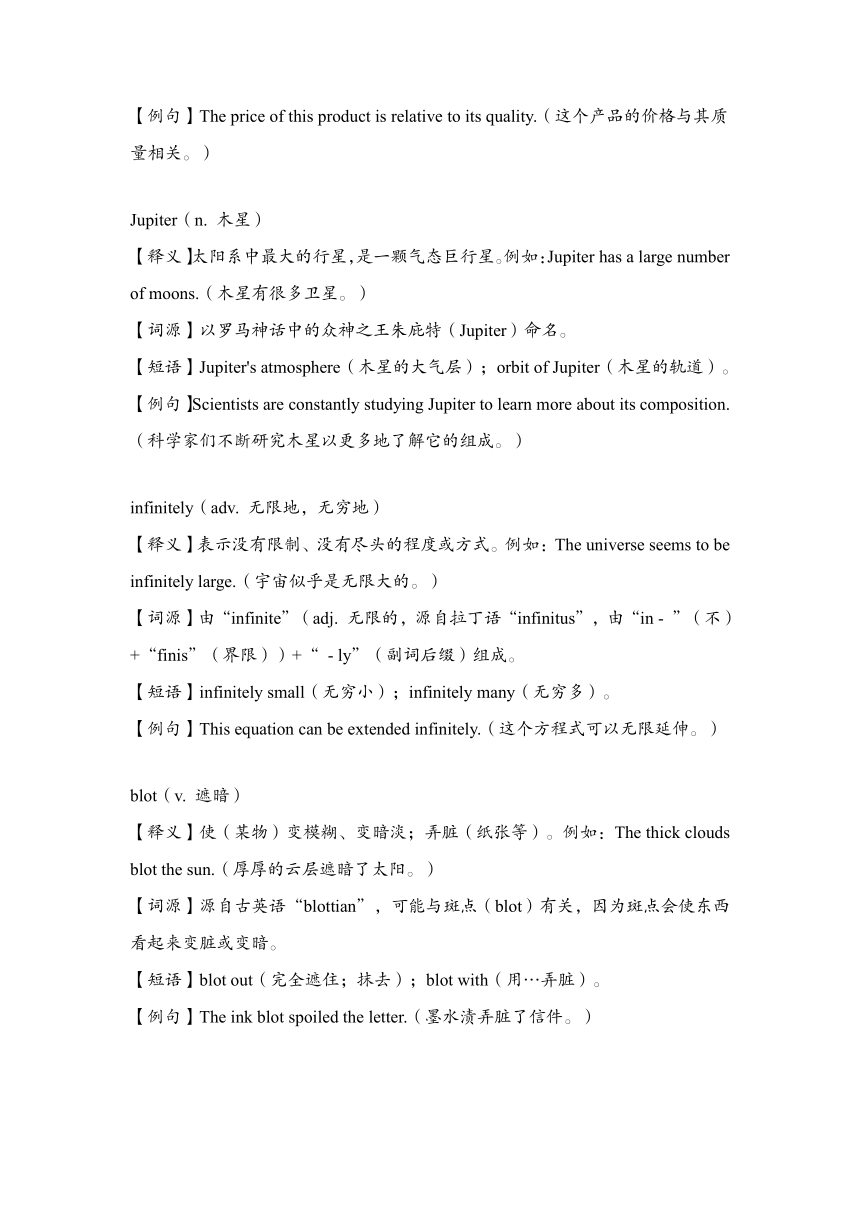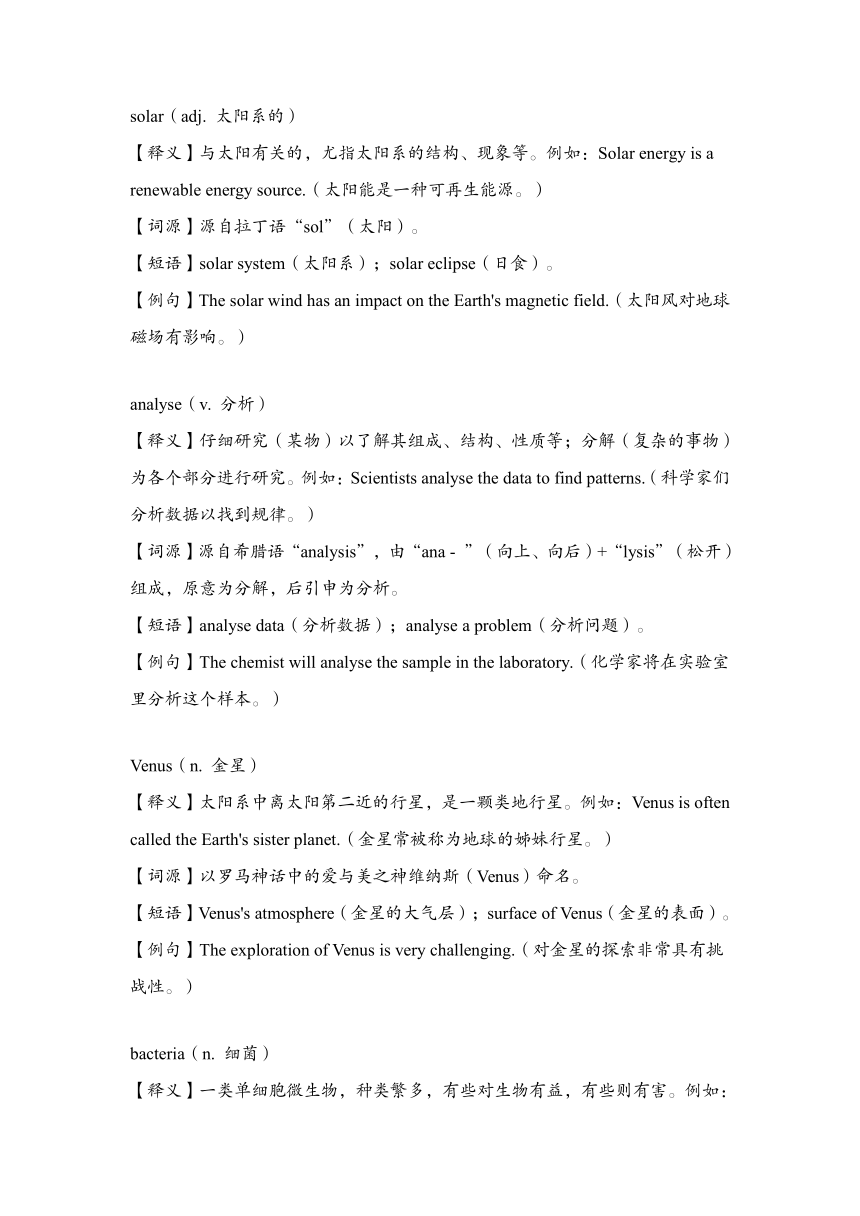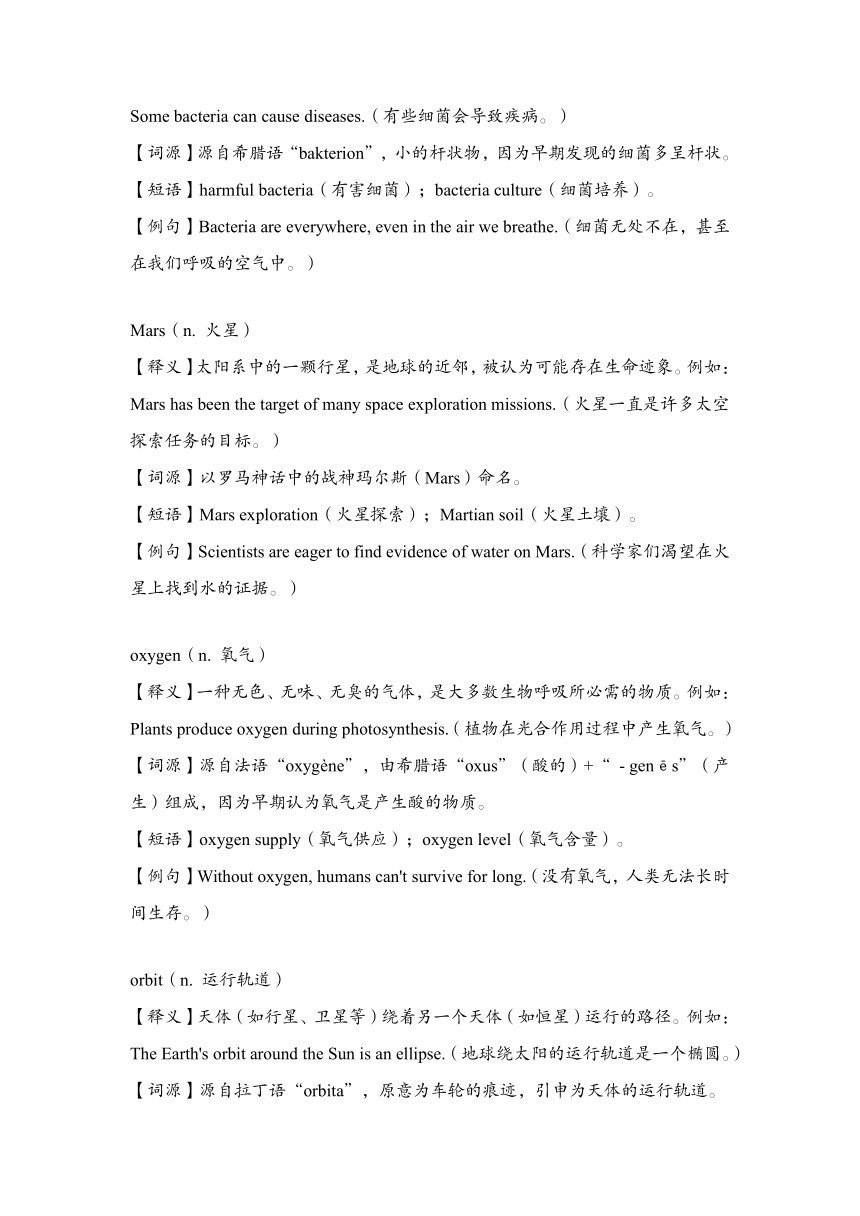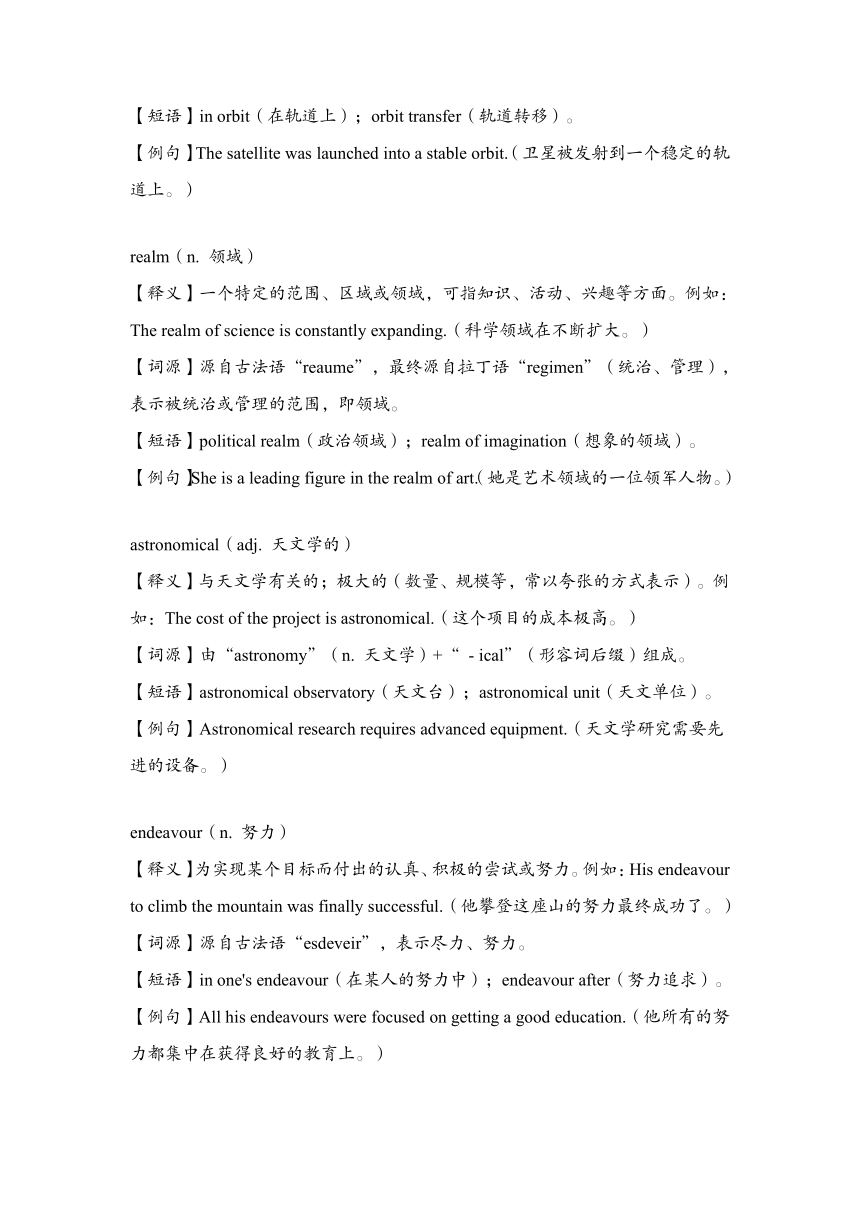新概念英语第三册 Lesson 55 From the Earth Greetings 讲义
文档属性
| 名称 | 新概念英语第三册 Lesson 55 From the Earth Greetings 讲义 |

|
|
| 格式 | docx | ||
| 文件大小 | 192.2KB | ||
| 资源类型 | 教案 | ||
| 版本资源 | 新概念英语 | ||
| 科目 | 英语 | ||
| 更新时间 | 2024-12-05 00:00:00 | ||
图片预览





文档简介
新概念第三册
Lesson 55 From the Earth Greetings
单词精讲
astronomy(1. 1)/ 'str n mi/n.天文学
【释义】研究天体(如恒星、行星、卫星、彗星、星系等)以及宇宙的结构、起源、演化等的科学学科。例如:Astronomy helps us understand the vastness of the universe.(天文学帮助我们理解宇宙的浩瀚。)
【词源】源自希腊语“astron”(星)+“ - nomy”(学科、法则),表示关于星星的学科。
【短语】radio astronomy(射电天文学);astronomy club(天文俱乐部)。
【例句】He has been interested in astronomy since he was a child.(他从小就对天文学感兴趣。)
particle(n. 微粒,粒子)
【释义】非常小的物质部分,可能是原子、分子或更小的单位。例如:Sub - atomic particles are the building blocks of matter.(亚原子粒子是物质的组成部分。)
【词源】源自拉丁语“particula”,是“pars”(部分)的小词形式,表示小部分,即微粒。
【短语】elementary particle(基本粒子);particle accelerator(粒子加速器)。
【例句】Dust particles are floating in the air.(灰尘微粒在空气中漂浮。)
relative(adj. 相对的)
【释义】与其他事物相比较而言的;有关系的、相关的。例如:The concept of time is relative.(时间的概念是相对的。)
【词源】源自拉丁语“relativus”,由“referre”(参考、涉及)派生而来,表示与其他事物有关的,相对的。
【短语】relative humidity(相对湿度);relative motion(相对运动)。
【例句】The price of this product is relative to its quality.(这个产品的价格与其质量相关。)
Jupiter(n. 木星)
【释义】太阳系中最大的行星,是一颗气态巨行星。例如:Jupiter has a large number of moons.(木星有很多卫星。)
【词源】以罗马神话中的众神之王朱庇特(Jupiter)命名。
【短语】Jupiter's atmosphere(木星的大气层);orbit of Jupiter(木星的轨道)。
【例句】Scientists are constantly studying Jupiter to learn more about its composition.(科学家们不断研究木星以更多地了解它的组成。)
infinitely(adv. 无限地,无穷地)
【释义】表示没有限制、没有尽头的程度或方式。例如:The universe seems to be infinitely large.(宇宙似乎是无限大的。)
【词源】由“infinite”(adj. 无限的,源自拉丁语“infinitus”,由“in - ”(不)+“finis”(界限))+“ - ly”(副词后缀)组成。
【短语】infinitely small(无穷小);infinitely many(无穷多)。
【例句】This equation can be extended infinitely.(这个方程式可以无限延伸。)
blot(v. 遮暗)
【释义】使(某物)变模糊、变暗淡;弄脏(纸张等)。例如:The thick clouds blot the sun.(厚厚的云层遮暗了太阳。)
【词源】源自古英语“blottian”,可能与斑点(blot)有关,因为斑点会使东西看起来变脏或变暗。
【短语】blot out(完全遮住;抹去);blot with(用…弄脏)。
【例句】The ink blot spoiled the letter.(墨水渍弄脏了信件。)
solar(adj. 太阳系的)
【释义】与太阳有关的,尤指太阳系的结构、现象等。例如:Solar energy is a renewable energy source.(太阳能是一种可再生能源。)
【词源】源自拉丁语“sol”(太阳)。
【短语】solar system(太阳系);solar eclipse(日食)。
【例句】The solar wind has an impact on the Earth's magnetic field.(太阳风对地球磁场有影响。)
analyse(v. 分析)
【释义】仔细研究(某物)以了解其组成、结构、性质等;分解(复杂的事物)为各个部分进行研究。例如:Scientists analyse the data to find patterns.(科学家们分析数据以找到规律。)
【词源】源自希腊语“analysis”,由“ana - ”(向上、向后)+“lysis”(松开)组成,原意为分解,后引申为分析。
【短语】analyse data(分析数据);analyse a problem(分析问题)。
【例句】The chemist will analyse the sample in the laboratory.(化学家将在实验室里分析这个样本。)
Venus(n. 金星)
【释义】太阳系中离太阳第二近的行星,是一颗类地行星。例如:Venus is often called the Earth's sister planet.(金星常被称为地球的姊妹行星。)
【词源】以罗马神话中的爱与美之神维纳斯(Venus)命名。
【短语】Venus's atmosphere(金星的大气层);surface of Venus(金星的表面)。
【例句】The exploration of Venus is very challenging.(对金星的探索非常具有挑战性。)
bacteria(n. 细菌)
【释义】一类单细胞微生物,种类繁多,有些对生物有益,有些则有害。例如:Some bacteria can cause diseases.(有些细菌会导致疾病。)
【词源】源自希腊语“bakterion”,小的杆状物,因为早期发现的细菌多呈杆状。
【短语】harmful bacteria(有害细菌);bacteria culture(细菌培养)。
【例句】Bacteria are everywhere, even in the air we breathe.(细菌无处不在,甚至在我们呼吸的空气中。)
Mars(n. 火星)
【释义】太阳系中的一颗行星,是地球的近邻,被认为可能存在生命迹象。例如:Mars has been the target of many space exploration missions.(火星一直是许多太空探索任务的目标。)
【词源】以罗马神话中的战神玛尔斯(Mars)命名。
【短语】Mars exploration(火星探索);Martian soil(火星土壤)。
【例句】Scientists are eager to find evidence of water on Mars.(科学家们渴望在火星上找到水的证据。)
oxygen(n. 氧气)
【释义】一种无色、无味、无臭的气体,是大多数生物呼吸所必需的物质。例如:Plants produce oxygen during photosynthesis.(植物在光合作用过程中产生氧气。)
【词源】源自法语“oxygène”,由希腊语“oxus”(酸的)+“ - genēs”(产生)组成,因为早期认为氧气是产生酸的物质。
【短语】oxygen supply(氧气供应);oxygen level(氧气含量)。
【例句】Without oxygen, humans can't survive for long.(没有氧气,人类无法长时间生存。)
orbit(n. 运行轨道)
【释义】天体(如行星、卫星等)绕着另一个天体(如恒星)运行的路径。例如:The Earth's orbit around the Sun is an ellipse.(地球绕太阳的运行轨道是一个椭圆。)
【词源】源自拉丁语“orbita”,原意为车轮的痕迹,引申为天体的运行轨道。
【短语】in orbit(在轨道上);orbit transfer(轨道转移)。
【例句】The satellite was launched into a stable orbit.(卫星被发射到一个稳定的轨道上。)
realm(n. 领域)
【释义】一个特定的范围、区域或领域,可指知识、活动、兴趣等方面。例如:The realm of science is constantly expanding.(科学领域在不断扩大。)
【词源】源自古法语“reaume”,最终源自拉丁语“regimen”(统治、管理),表示被统治或管理的范围,即领域。
【短语】political realm(政治领域);realm of imagination(想象的领域)。
【例句】She is a leading figure in the realm of art.(她是艺术领域的一位领军人物。)
astronomical(adj. 天文学的)
【释义】与天文学有关的;极大的(数量、规模等,常以夸张的方式表示)。例如:The cost of the project is astronomical.(这个项目的成本极高。)
【词源】由“astronomy”(n. 天文学)+“ - ical”(形容词后缀)组成。
【短语】astronomical observatory(天文台);astronomical unit(天文单位)。
【例句】Astronomical research requires advanced equipment.(天文学研究需要先进的设备。)
endeavour(n. 努力)
【释义】为实现某个目标而付出的认真、积极的尝试或努力。例如:His endeavour to climb the mountain was finally successful.(他攀登这座山的努力最终成功了。)
【词源】源自古法语“esdeveir”,表示尽力、努力。
【短语】in one's endeavour(在某人的努力中);endeavour after(努力追求)。
【例句】All his endeavours were focused on getting a good education.(他所有的努力都集中在获得良好的教育上。)
generate(v. 产生)
【释义】使(某物)存在或出现;创造、引起(如能量、情感等)。例如:The power plant generates electricity.(发电厂发电。)
【词源】源自拉丁语“generare”,由“genus”(种类、家族)派生而来,表示产生同类的东西,即产生。
【短语】generate heat(产生热量);generate income(产生收入)。
【例句】The new policy will generate a lot of discussion.(新政策将引发很多讨论。)
二、课文精讲
Recent developments in astronomy have made it possible to detect planets in our own Milky Way and in other galaxies.
-astronomy / str n. .mi/ n.天文学
-detect /d tekt/ v.(通常指用特殊设备)探测,检测,测出
-planet / pl n. t/ n.行星
-Milky Way,银河。
-galaxy / ɡ l. k.si/ n.星系
译文:天文学的最新发展让我们能够在银河系和其他星系中探测到其他的行星。
This is a major achievement because, in relative terms, planets are very small and do not emit light. Finding planets is proving hard enough, but finding life on them will prove infinitely more difficult.
-in relative terms ,相比较而言。
-infinitely / n.f .n t.li/ adv.非常;无限地;极大地
译文:这是一项很大的成就,因为相对而言,行星非常小且不会发光。找到行星本就不容易,但是要在行星上发现生命迹象那就更困难了。
The first question to answer is whether a planet can actually support life. In our own solar system, for example, Venus is far too hot and Mars is far too cold to support life.
-the solar system, 太阳系
-Venus / vi .n s/ n.金星
-Mars /mɑ z/ n.火星
译文:第一个要了解的问题就是这个行星是否能够维持生命。比如说,我们所在的太阳系中,金星太冷而火星又太热,都不适合生存。
Only the Earth provides ideal conditions, and even here it has taken more than four billion years for plant and animal life to evolve.
-evolve / v lv/ v.(使)逐步发展;(使)逐步演变;(使)逐渐形成;(使)进化
译文:只有地球能够提供理想的生活条件,即使在地球,植物和动物的进化也用了40亿多年。
Whether a planet can support life depends on the size and brightness of its star, that is its 'sun'.
-以whether引导的名词性从句作句子的主语。
译文:一颗行星是否能支持生命取决于它的大小和它的‘恒星’的亮度,也就是它的‘太阳’。
Imagine a star up to twenty times larger, brighter and hotter than our own sun. A planet would have to be a very long way from it to be capable of supporting life.
译文:想象一下,如果有一颗恒星,无论大小、亮度、热度,都比我们的太阳要大20倍。那行星就必须离它足够远,才能够维系生命。
Alternatively, if the star were small, the life supporting planet would have to have a close orbit round it and also provide the perfect conditions for life forms to develop.
-alternatively / l t .n .t v.li/ adv.(用来建议别种可能性)要不,或者
-orbit / .b t/ n.运行
译文:或者,如果恒星很小,那行星就必须绕着它近距离运行,这样也能维系生命。
But how would we find such a planet At present, there is no telescope in existence that is capable of detecting the presence of life. The development of such a telescope will be one of the great astronomical projects of the twenty-first century.
-telescope / tel. .sk p/ n.望远镜
-astronomical / s.tr n m. .k l/ adj.天文学的;天文的,天体的
译文:但我们如何找到这样的行星呢?目前为止,还没有任何望远镜能够探测到生命的迹象。这种望远镜的发展,将会是21世纪最重要的天文学项目之一。
It is impossible to look for life on another planet using earth-based telescopes. Our own warm atmosphere and the heat generated by the telescope would make it impossible to detect objects as small as planets.
-atmosphere / t.m .sf r/ n.(包围地球的)大气,大气层,大气圈
-earth-based telescopes,放置在地球上的望远镜。
译文:放置在地球上的望远镜使是无法在其他行星上寻找生命迹象的。因为地球温暖的大气层,和望远镜产生的热,会让我们无法探测到比行星更小的物体。
Even a telescope in orbit round the earth, like the very successful Hubble telescope, would not be suitable because of the dust particles in our solar system.
-particle / pɑ .t .k l/ n.微粒,粒子
译文:即使是绕着地球运行的望远镜,像著名的哈勃望远镜,也因为太阳系中的尘粒而无法做到。
A telescope would have to be as far away as the planet Jupiter to look for life in outer space, because the dust becomes thinner the further we travel towards the outer edges of our own solar system.
-Jupiter / d u .p .t r/ n.木星
-outer space, 外层空间,太空
译文:一座望远镜至少要像木星那么远,才能够在外太空探索生命。因为越靠近太阳系的边际,尘粒就会越来越稀少。
Once we detected a planet, we would have to find a way of blotting out the light from its star, so that we would be able to 'see' the planet properly and analyse its atmosphere.
-blot out, 遮蔽(尤指阳光)。
译文:一旦探测到行星,我们还要想办法遮蔽它的恒星散发出来的光,这样我们就能好好地看清这颗行星,分析它的大气层。
In the first instance, we would be looking for plant life, rather than 'little green men'. The life forms most likely to develop on a planet would be bacteria. It is bacteria that have generated the oxygen we breathe on earth.
-in the first instance 首先。
-bacteria /b k t .ri. / n.细菌
-it is ... that ... , 强调句型。
译文:首先,我们要寻找有没有植物存在,而不是‘绿色的小人’。最有可能在行星上发展的就是细菌。正是这种细菌产生氧气,让我们在地球上能够呼吸。
For most of the earth's history they have been the only form of life on our planet. As Earth-dwellers, we always cherish the hope that we will be visited by little green men and that we will be able to communicate with them.
-dweller / dwel. r/ n.城市/城镇/洞穴等居民
-cherish / t er. / v.珍藏,怀有(希望、记忆);抱有(想法)
译文: 在地球很长的历史过程中,细菌是唯一的生命形式。作为地球的居民,我们总是抱有一种希望,就是绿色的外星人会来做客,我们也能够与他们进行交流。
But this hope is always in the realms of science fiction. If we were able to discover lowly forms of life like bacteria on another planet, it would completely change our view of ourselves.
-in the realms of science fiction,在科幻小说中存在。
-lowly / l .li/ adj. 低等的,卑微的
译文:但这种希望总是在科幻小说中存在。如果我们能够在其他行星上发现低端生物比如细菌,将会彻底改变我们对自己的看法。
As Daniel Goldin of NASA observed, 'Finding life elsewhere would change everything. No human endeavour or thought would be unchanged by it. '
-NASA,这是国家航空和宇宙航空局的首字母缩写(也可作N.A.S.A.或Nasa)。这个组织建于1958年,负责组织美国的航空宇航研究。它的巨大成功之一便是1969年7月21日把一个人(内尔·阿姆斯特朗,乘“阿波罗11”号宇宙飞船)送上了月球。
译文:正如NASA 成员丹尼尔·戈尔丁所说,‘在其他地方找到生命将会改变一切,人类的努力和想法都会被改变。’
Lesson 55 From the Earth Greetings
单词精讲
astronomy(1. 1)/ 'str n mi/n.天文学
【释义】研究天体(如恒星、行星、卫星、彗星、星系等)以及宇宙的结构、起源、演化等的科学学科。例如:Astronomy helps us understand the vastness of the universe.(天文学帮助我们理解宇宙的浩瀚。)
【词源】源自希腊语“astron”(星)+“ - nomy”(学科、法则),表示关于星星的学科。
【短语】radio astronomy(射电天文学);astronomy club(天文俱乐部)。
【例句】He has been interested in astronomy since he was a child.(他从小就对天文学感兴趣。)
particle(n. 微粒,粒子)
【释义】非常小的物质部分,可能是原子、分子或更小的单位。例如:Sub - atomic particles are the building blocks of matter.(亚原子粒子是物质的组成部分。)
【词源】源自拉丁语“particula”,是“pars”(部分)的小词形式,表示小部分,即微粒。
【短语】elementary particle(基本粒子);particle accelerator(粒子加速器)。
【例句】Dust particles are floating in the air.(灰尘微粒在空气中漂浮。)
relative(adj. 相对的)
【释义】与其他事物相比较而言的;有关系的、相关的。例如:The concept of time is relative.(时间的概念是相对的。)
【词源】源自拉丁语“relativus”,由“referre”(参考、涉及)派生而来,表示与其他事物有关的,相对的。
【短语】relative humidity(相对湿度);relative motion(相对运动)。
【例句】The price of this product is relative to its quality.(这个产品的价格与其质量相关。)
Jupiter(n. 木星)
【释义】太阳系中最大的行星,是一颗气态巨行星。例如:Jupiter has a large number of moons.(木星有很多卫星。)
【词源】以罗马神话中的众神之王朱庇特(Jupiter)命名。
【短语】Jupiter's atmosphere(木星的大气层);orbit of Jupiter(木星的轨道)。
【例句】Scientists are constantly studying Jupiter to learn more about its composition.(科学家们不断研究木星以更多地了解它的组成。)
infinitely(adv. 无限地,无穷地)
【释义】表示没有限制、没有尽头的程度或方式。例如:The universe seems to be infinitely large.(宇宙似乎是无限大的。)
【词源】由“infinite”(adj. 无限的,源自拉丁语“infinitus”,由“in - ”(不)+“finis”(界限))+“ - ly”(副词后缀)组成。
【短语】infinitely small(无穷小);infinitely many(无穷多)。
【例句】This equation can be extended infinitely.(这个方程式可以无限延伸。)
blot(v. 遮暗)
【释义】使(某物)变模糊、变暗淡;弄脏(纸张等)。例如:The thick clouds blot the sun.(厚厚的云层遮暗了太阳。)
【词源】源自古英语“blottian”,可能与斑点(blot)有关,因为斑点会使东西看起来变脏或变暗。
【短语】blot out(完全遮住;抹去);blot with(用…弄脏)。
【例句】The ink blot spoiled the letter.(墨水渍弄脏了信件。)
solar(adj. 太阳系的)
【释义】与太阳有关的,尤指太阳系的结构、现象等。例如:Solar energy is a renewable energy source.(太阳能是一种可再生能源。)
【词源】源自拉丁语“sol”(太阳)。
【短语】solar system(太阳系);solar eclipse(日食)。
【例句】The solar wind has an impact on the Earth's magnetic field.(太阳风对地球磁场有影响。)
analyse(v. 分析)
【释义】仔细研究(某物)以了解其组成、结构、性质等;分解(复杂的事物)为各个部分进行研究。例如:Scientists analyse the data to find patterns.(科学家们分析数据以找到规律。)
【词源】源自希腊语“analysis”,由“ana - ”(向上、向后)+“lysis”(松开)组成,原意为分解,后引申为分析。
【短语】analyse data(分析数据);analyse a problem(分析问题)。
【例句】The chemist will analyse the sample in the laboratory.(化学家将在实验室里分析这个样本。)
Venus(n. 金星)
【释义】太阳系中离太阳第二近的行星,是一颗类地行星。例如:Venus is often called the Earth's sister planet.(金星常被称为地球的姊妹行星。)
【词源】以罗马神话中的爱与美之神维纳斯(Venus)命名。
【短语】Venus's atmosphere(金星的大气层);surface of Venus(金星的表面)。
【例句】The exploration of Venus is very challenging.(对金星的探索非常具有挑战性。)
bacteria(n. 细菌)
【释义】一类单细胞微生物,种类繁多,有些对生物有益,有些则有害。例如:Some bacteria can cause diseases.(有些细菌会导致疾病。)
【词源】源自希腊语“bakterion”,小的杆状物,因为早期发现的细菌多呈杆状。
【短语】harmful bacteria(有害细菌);bacteria culture(细菌培养)。
【例句】Bacteria are everywhere, even in the air we breathe.(细菌无处不在,甚至在我们呼吸的空气中。)
Mars(n. 火星)
【释义】太阳系中的一颗行星,是地球的近邻,被认为可能存在生命迹象。例如:Mars has been the target of many space exploration missions.(火星一直是许多太空探索任务的目标。)
【词源】以罗马神话中的战神玛尔斯(Mars)命名。
【短语】Mars exploration(火星探索);Martian soil(火星土壤)。
【例句】Scientists are eager to find evidence of water on Mars.(科学家们渴望在火星上找到水的证据。)
oxygen(n. 氧气)
【释义】一种无色、无味、无臭的气体,是大多数生物呼吸所必需的物质。例如:Plants produce oxygen during photosynthesis.(植物在光合作用过程中产生氧气。)
【词源】源自法语“oxygène”,由希腊语“oxus”(酸的)+“ - genēs”(产生)组成,因为早期认为氧气是产生酸的物质。
【短语】oxygen supply(氧气供应);oxygen level(氧气含量)。
【例句】Without oxygen, humans can't survive for long.(没有氧气,人类无法长时间生存。)
orbit(n. 运行轨道)
【释义】天体(如行星、卫星等)绕着另一个天体(如恒星)运行的路径。例如:The Earth's orbit around the Sun is an ellipse.(地球绕太阳的运行轨道是一个椭圆。)
【词源】源自拉丁语“orbita”,原意为车轮的痕迹,引申为天体的运行轨道。
【短语】in orbit(在轨道上);orbit transfer(轨道转移)。
【例句】The satellite was launched into a stable orbit.(卫星被发射到一个稳定的轨道上。)
realm(n. 领域)
【释义】一个特定的范围、区域或领域,可指知识、活动、兴趣等方面。例如:The realm of science is constantly expanding.(科学领域在不断扩大。)
【词源】源自古法语“reaume”,最终源自拉丁语“regimen”(统治、管理),表示被统治或管理的范围,即领域。
【短语】political realm(政治领域);realm of imagination(想象的领域)。
【例句】She is a leading figure in the realm of art.(她是艺术领域的一位领军人物。)
astronomical(adj. 天文学的)
【释义】与天文学有关的;极大的(数量、规模等,常以夸张的方式表示)。例如:The cost of the project is astronomical.(这个项目的成本极高。)
【词源】由“astronomy”(n. 天文学)+“ - ical”(形容词后缀)组成。
【短语】astronomical observatory(天文台);astronomical unit(天文单位)。
【例句】Astronomical research requires advanced equipment.(天文学研究需要先进的设备。)
endeavour(n. 努力)
【释义】为实现某个目标而付出的认真、积极的尝试或努力。例如:His endeavour to climb the mountain was finally successful.(他攀登这座山的努力最终成功了。)
【词源】源自古法语“esdeveir”,表示尽力、努力。
【短语】in one's endeavour(在某人的努力中);endeavour after(努力追求)。
【例句】All his endeavours were focused on getting a good education.(他所有的努力都集中在获得良好的教育上。)
generate(v. 产生)
【释义】使(某物)存在或出现;创造、引起(如能量、情感等)。例如:The power plant generates electricity.(发电厂发电。)
【词源】源自拉丁语“generare”,由“genus”(种类、家族)派生而来,表示产生同类的东西,即产生。
【短语】generate heat(产生热量);generate income(产生收入)。
【例句】The new policy will generate a lot of discussion.(新政策将引发很多讨论。)
二、课文精讲
Recent developments in astronomy have made it possible to detect planets in our own Milky Way and in other galaxies.
-astronomy / str n. .mi/ n.天文学
-detect /d tekt/ v.(通常指用特殊设备)探测,检测,测出
-planet / pl n. t/ n.行星
-Milky Way,银河。
-galaxy / ɡ l. k.si/ n.星系
译文:天文学的最新发展让我们能够在银河系和其他星系中探测到其他的行星。
This is a major achievement because, in relative terms, planets are very small and do not emit light. Finding planets is proving hard enough, but finding life on them will prove infinitely more difficult.
-in relative terms ,相比较而言。
-infinitely / n.f .n t.li/ adv.非常;无限地;极大地
译文:这是一项很大的成就,因为相对而言,行星非常小且不会发光。找到行星本就不容易,但是要在行星上发现生命迹象那就更困难了。
The first question to answer is whether a planet can actually support life. In our own solar system, for example, Venus is far too hot and Mars is far too cold to support life.
-the solar system, 太阳系
-Venus / vi .n s/ n.金星
-Mars /mɑ z/ n.火星
译文:第一个要了解的问题就是这个行星是否能够维持生命。比如说,我们所在的太阳系中,金星太冷而火星又太热,都不适合生存。
Only the Earth provides ideal conditions, and even here it has taken more than four billion years for plant and animal life to evolve.
-evolve / v lv/ v.(使)逐步发展;(使)逐步演变;(使)逐渐形成;(使)进化
译文:只有地球能够提供理想的生活条件,即使在地球,植物和动物的进化也用了40亿多年。
Whether a planet can support life depends on the size and brightness of its star, that is its 'sun'.
-以whether引导的名词性从句作句子的主语。
译文:一颗行星是否能支持生命取决于它的大小和它的‘恒星’的亮度,也就是它的‘太阳’。
Imagine a star up to twenty times larger, brighter and hotter than our own sun. A planet would have to be a very long way from it to be capable of supporting life.
译文:想象一下,如果有一颗恒星,无论大小、亮度、热度,都比我们的太阳要大20倍。那行星就必须离它足够远,才能够维系生命。
Alternatively, if the star were small, the life supporting planet would have to have a close orbit round it and also provide the perfect conditions for life forms to develop.
-alternatively / l t .n .t v.li/ adv.(用来建议别种可能性)要不,或者
-orbit / .b t/ n.运行
译文:或者,如果恒星很小,那行星就必须绕着它近距离运行,这样也能维系生命。
But how would we find such a planet At present, there is no telescope in existence that is capable of detecting the presence of life. The development of such a telescope will be one of the great astronomical projects of the twenty-first century.
-telescope / tel. .sk p/ n.望远镜
-astronomical / s.tr n m. .k l/ adj.天文学的;天文的,天体的
译文:但我们如何找到这样的行星呢?目前为止,还没有任何望远镜能够探测到生命的迹象。这种望远镜的发展,将会是21世纪最重要的天文学项目之一。
It is impossible to look for life on another planet using earth-based telescopes. Our own warm atmosphere and the heat generated by the telescope would make it impossible to detect objects as small as planets.
-atmosphere / t.m .sf r/ n.(包围地球的)大气,大气层,大气圈
-earth-based telescopes,放置在地球上的望远镜。
译文:放置在地球上的望远镜使是无法在其他行星上寻找生命迹象的。因为地球温暖的大气层,和望远镜产生的热,会让我们无法探测到比行星更小的物体。
Even a telescope in orbit round the earth, like the very successful Hubble telescope, would not be suitable because of the dust particles in our solar system.
-particle / pɑ .t .k l/ n.微粒,粒子
译文:即使是绕着地球运行的望远镜,像著名的哈勃望远镜,也因为太阳系中的尘粒而无法做到。
A telescope would have to be as far away as the planet Jupiter to look for life in outer space, because the dust becomes thinner the further we travel towards the outer edges of our own solar system.
-Jupiter / d u .p .t r/ n.木星
-outer space, 外层空间,太空
译文:一座望远镜至少要像木星那么远,才能够在外太空探索生命。因为越靠近太阳系的边际,尘粒就会越来越稀少。
Once we detected a planet, we would have to find a way of blotting out the light from its star, so that we would be able to 'see' the planet properly and analyse its atmosphere.
-blot out, 遮蔽(尤指阳光)。
译文:一旦探测到行星,我们还要想办法遮蔽它的恒星散发出来的光,这样我们就能好好地看清这颗行星,分析它的大气层。
In the first instance, we would be looking for plant life, rather than 'little green men'. The life forms most likely to develop on a planet would be bacteria. It is bacteria that have generated the oxygen we breathe on earth.
-in the first instance 首先。
-bacteria /b k t .ri. / n.细菌
-it is ... that ... , 强调句型。
译文:首先,我们要寻找有没有植物存在,而不是‘绿色的小人’。最有可能在行星上发展的就是细菌。正是这种细菌产生氧气,让我们在地球上能够呼吸。
For most of the earth's history they have been the only form of life on our planet. As Earth-dwellers, we always cherish the hope that we will be visited by little green men and that we will be able to communicate with them.
-dweller / dwel. r/ n.城市/城镇/洞穴等居民
-cherish / t er. / v.珍藏,怀有(希望、记忆);抱有(想法)
译文: 在地球很长的历史过程中,细菌是唯一的生命形式。作为地球的居民,我们总是抱有一种希望,就是绿色的外星人会来做客,我们也能够与他们进行交流。
But this hope is always in the realms of science fiction. If we were able to discover lowly forms of life like bacteria on another planet, it would completely change our view of ourselves.
-in the realms of science fiction,在科幻小说中存在。
-lowly / l .li/ adj. 低等的,卑微的
译文:但这种希望总是在科幻小说中存在。如果我们能够在其他行星上发现低端生物比如细菌,将会彻底改变我们对自己的看法。
As Daniel Goldin of NASA observed, 'Finding life elsewhere would change everything. No human endeavour or thought would be unchanged by it. '
-NASA,这是国家航空和宇宙航空局的首字母缩写(也可作N.A.S.A.或Nasa)。这个组织建于1958年,负责组织美国的航空宇航研究。它的巨大成功之一便是1969年7月21日把一个人(内尔·阿姆斯特朗,乘“阿波罗11”号宇宙飞船)送上了月球。
译文:正如NASA 成员丹尼尔·戈尔丁所说,‘在其他地方找到生命将会改变一切,人类的努力和想法都会被改变。’
同课章节目录
